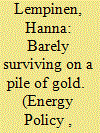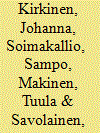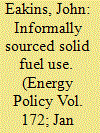| Srl | Item |
| 1 |
ID:
166363


|
|
|
|
|
| Summary/Abstract |
While the share of peat in Finland's energy mix today amounts to only around 4%, peat recurrently returns to the center stage in Finnish energy-related public debates. As an indigenous energy resource, peat is a welcome addition to the energy mix of the heavily energy-dependent country. In addition, the employment impacts of peat production are considered significant. These benefits are, however, contradicted by the environmental impacts and climate emissions caused by peat energy. The conflicting interests revolving around peat have resulted in constantly shifting national peat policies as well as infrequent “explosions” of public and political debates on peat production. This article explores two of the most recent politicizations of peat through an empirical focus on the short-lived promotion campaigns that sparked widespread public debate: the 2010 “2 prosenttia” [2%] internet campaign from the state-majority-owned energy company VAPO and the 2017 “Turveinfo” [peat info] campaign launched by The Bioenergy Association of Finland. Through an analysis of the colorful and provocative promotion campaigns, this article (1) explores the arguments and rhetoric through which political support of peat is being acquired from the Finnish public and (2) examines what crises in the 2010s Finland peat is constructed as the (only) logical answer for.
|
|
|
|
|
|
|
|
|
|
|
|
|
|
|
|
| 2 |
ID:
093501


|
|
|
|
|
| Publication |
2010.
|
| Summary/Abstract |
New raw materials for transportation fuels need to be introduced, in order to fight against climate change and also to cope with increasing risks of availability and price of oil. Peat has been recognised suitable raw material option for diesel produced by gasification and Fischer-Tropsch (FT) synthesis. The energy content of Finnish peat reserves is remarkable. In this study, the greenhouse impact of peat-based FT diesel production and utilisation in Finland was assessed from the life-cycle point of view. In 100 year's time horizon the greenhouse impact of peat-based FT diesel is likely larger than the impact of fossil diesel. The impact can somewhat be lowered by producing peat from the agricultural peatland (strong greenhouse gas emissions from the decaying peatlayer are avoided) with new peat production technique, and utilising the produced biomass from the after-treatment area for diesel also. If diesel production is integrated with pulp and paper mill to achieve energy efficiency benefits and if the electricity demand can be covered by zero emission electricity, the greenhouse impact of peat-based FT diesel reduces to the level of fossil diesel when agricultural peatland is used, and is somewhat higher when forestry-drained peatland is used as raw material source.
|
|
|
|
|
|
|
|
|
|
|
|
|
|
|
|
| 3 |
ID:
188561


|
|
|
|
|
| Summary/Abstract |
Developing effective policy solutions to transition away from the use of solid fuels for residential heating purposes can be hindered by the lack of reliable data on its use. One such issue is the extent of informal solid fuel use, that is, consumption from sources outside of formal commercial channels. This is an area which has been largely ignored in previous empirical research. Using a survey of residential solid fuel users, the extent of solid fuel use in the residential sector in Ireland from informal sources for two fuels, sod peat and wood, is quantified. Sod peat is found to be almost exclusively sourced informally while just over half of wood use is estimated to be sourced by households in this way. Factors including location, household income, being a primary user of the fuel and having strong cost motivations all effect the probability of sourcing solid fuels informally relative to formal sources. The sizeable extent to which informal sources of solid fuels are used in Ireland arising from the analysis in this paper, highlights the potential for substitution to this unregulated alternative. This should be carefully monitored for effective implementation of new and existing solid fuel regulations.
|
|
|
|
|
|
|
|
|
|
|
|
|
|
|
|